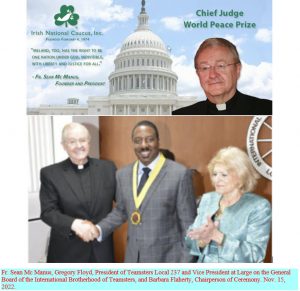ROVING FOR PEACE BY GREGORY FLOYD
Posted By: November 25, 2022
Recently I was awarded the World Peace Prize and named: “Roving Ambassador for Peace.” This prestigious award was bestowed upon me—the first Teamster to be honored by this organization dedicated to social and labor justice—by Father Sean McManus, president and founder of the Washington-based Irish National Caucus. In his remarks, McManus said that I was “the perfect exemplar and role model for the World Peace Prize.” WOW! It was an extraordinary moment that made me think, how exactly do you “rove for peace”? That’s not so easy.
The awards ceremony was filled with noble talk on weighty issues. McManus spoke about their two main objectives: to assert the basic principle that peace is the fruit of justice and that working for peace means, in fact, working for social justice. And to firmly place the American Labor Movement in the category of those who work for peace—all the time, every day, year-after-year since the late 1800s. That’s a big goal. McManus went on to quote from several biblical scholars and members of the clergy who support the notion that working for justice is required for those with faith in God or those people simply of good will. He mentioned that the Rev. Dr. Martin Luther King Jr. loved to quote the Prophet Amos, who said: “Let justice roll down like water, and righteousness like an ever-flowing stream.” McManus said that even “people of no faith and no religion—but of good will—can agree in principle with these words. All people of good will, all fair-minded people, recognize that, without justice, civilized society cannot stand; fair treatment cannot stand; fair employment cannot stand; and a just and living wage cannot stand. That is how central and basic social justice is. It unites people of faith who want to do God’s work on Earth—and it unites people of no faith who want to do the fair and decent thing.”
Upon receiving a plaque and medal at the awards ceremony, I addressed the audience, telling them, “To receive an award inspired by the work of some of America’s greatest leaders in social and labor justice—like Dr. Martin Luther King Jr. and AFL-CIO President Richard Trumka—is humbling. They believed that labor justice and social justice are forever intertwined. You can’t have one without the other. But equality, respect and compassion should not only be workplace goals, but also everyday goals of humanity. Dr. King perhaps expressed it best when he said: ‘Injustice anywhere is a threat to justice everywhere.’ Dr. King also said: ‘Our lives begin to end the day we become silent about things that matter.’ How well that fits the mission of the World Peace Foundation, which is to NOT remain silent in the face of threats to justice and peace. And it is the mission of labor unions, like Teamsters Local 237 NOT to be silent either.”
So now that I am entrusted with a mighty title and lofty assignment, questions remain, how does one “rove for peace”? Is it something you actively look for like a missing puzzle piece? And where do you search? Or is peace something you can create like a painting? Is it something you can achieve alone, or does it require collaboration? And perhaps the biggest question: once you’ve found it, what’s the next step? Beatle John Lennon had a suggestion when he famously wrote the song verse “Give peace a chance.” The irony here, of course, is that this is now etched in stone in Central Park, where he was assassinated. Clearly, roving for peace is complicated. Perhaps the job needs to be broken-down into parts: a sort of micro/macro distinction of personal peace and world peace. Peace of mind can be derived from the satisfaction found in offering kindness and compassion to others…feeling good about yourself because you helped someone, especially someone in need. World peace is trickier and requires a bigger operation, yet starts by voting and helping to elect people who are admirable and worthy of our trust—people who seek public office not for personal gain but instead, as Father McManus said, are “people of principles who just want to do the decent thing.” Macro peace thereby can only be achieved by those who will lead us with an unwavering commitment for justice and fairness.
Clearly, the job of a “Roving Ambassador for Peace” is to identify people of good will, inspired by Spike Lee’s advice to “do the right thing” and encourage them to get involved.











